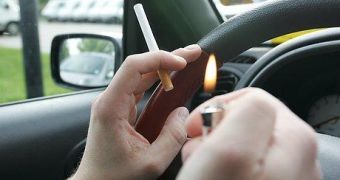The journal Tobacco Control has recently witnessed the publication of a new study stating that, when carpooling with a smoker, 10 minutes are more than enough for the people in the vehicle to become exposed to pollutants concentrations that exceed those found in one's run-off-the-mill bars and casinos.
In order to come up with this troubling conclusion, researchers investigated the quality of the air found in vehicles in which just three cigarettes had been smoked throughout the course of an hour.
The specialists also analyzed the air found in the car's proximity, and mainly focused on harmful chemical compounds such as particulate matter, polycyclic aromatic hydrocarbons, carbon monoxide and nicotine, Eurek! Alert explains.
These tests led them to the conclusion that, when compared to the air outside, the air found inside a smoker's vehicle contains about three times more pollutants.
This means that, in just 10 minutes, children and people already suffering from various medical conditions stand to inhale significant amounts of harmful chemical compounds.
What worries researchers the most is how children might respond to being exposed to these increased pollutants concentrations, especially given the fact that polycyclic aromatic hydrocarbons are known to cause disturbances of the body's immune system, IQ fluctuations and allergic sensitization.
More so seeing how, for the time being, smoking inside the car when traveling with children is still allowed in as many as 44 American states.
“Children are more vulnerable than adults, and their exposures to tobacco smoke in a vehicle are completely controlled by the adults with whom they share the vehicle,” the researchers who looked into this issue explain.
“Although regulations have been enacted to protect non-smokers, including children in many public venues, second hand smoke exposures to children in vehicles are permitted in 44 of 50 US states, and in most countries worldwide,” they go on to add.
The researchers hope that their finding will lead to the implementation of new laws that ban smoking in a car when traveling with children and people who, for one reason or another, are more vulnerable to pollutants than ordinary folks are.

 14 DAY TRIAL //
14 DAY TRIAL //